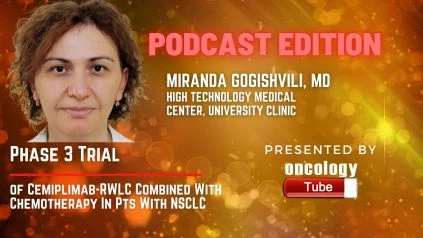Miranda Gogishvili, MD High Technology Medical Center, University Clinic speaks about Phase 3 Trial of Libtayo® (Cemiplamab-RWLC) Combined With Chemotherapy Stopped Early Due to Significant Improvement In Overall Survival In Patients With First-line Advanced Non-small Cell Lung Cancer.
Link to Article:
https://investor.regeneron.com/news-releases/news-release-details/phase-3-trial-libtayor-cemiplimab-rwlc-combined-chemotherapy
The combination of Libtayo and chemotherapy enhanced median overall survival from 13 to 22 months, lowering the chance of mortality by 29%.
Patients with locally progressed and metastatic disease with squamous or non-squamous histology and all levels of PD-L1 expression were included in the study.
Libtayo has now been shown to enhance overall survival in first-line advanced non-small cell lung cancer patients either used alone or in conjunction with chemotherapy.
The Phase 3 trial of the PD-1 inhibitor Libtayo in combination with platinum-doublet chemotherapy was stopped early today after meeting its overall survival (OS) primary endpoint in patients with advanced non-small cell lung cancer, according to Regeneron Pharmaceuticals, Inc. (NASDAQ: REGN) and Sanofi (NSCLC). In a study that included patients with metastatic or locally advanced illness, tumors with either squamous or non-squamous histology, and all PD-L1 expression levels, adding Libtayo to chemotherapy significantly improved OS compared to chemotherapy alone. These data will be used to support regulatory filings in the United States and the European Union.
The decision to discontinue the study early was made after the Independent Data Monitoring Committee (IDMC) made a recommendation during a protocol-mandated interim review. Combining Libtayo with chemotherapy decreased the risk of mortality by 29% compared to chemotherapy alone (hazard ratio: 0.71; 95 percent confidence interval [CI]: 0.53-0.93; p=0.014) in this top-line initial study of 466 patients. For Libtayo and chemotherapy, the median OS was 22 months (95 percent CI: 16 months to not evaluable), while for chemotherapy alone, it was 13 months (95 percent CI: 12 to 16 months). The IDMC review found no new Libtayo safety signals, and more thorough effectiveness and safety data will be presented at a future medical conference.
Lung cancer is the most common cancer-related mortality worldwide. In 2020, an estimated 2.2 million and 225,000 new cases worldwide and in the United States, respectively, will be diagnosed. NSCLC accounts for over 84 percent of all lung cancer diagnoses, with 75 percent of these instances being detected at an advanced stage. While PD-1 inhibitor monotherapy has largely progressed the treatment of NSCLC with 50% PD-L1 expression, this is the most frequent therapeutic scenario, with roughly 70% of all NSCLC patients having 50% PD-L1 expression.
Libtayo is presently being studied in conjunction with chemotherapy for advanced NSCLC, and its safety and effectiveness have not been thoroughly assessed by any regulatory body.
Concerning the Phase 3 Trial
EMPOWER-Lung 3 was a randomized, multicenter Phase 3 study that evaluated Libtayo plus platinum-doublet chemotherapy as a first-line treatment in squamous or non-squamous advanced NSCLC, regardless of PD-L1 expression, to platinum-doublet chemotherapy alone. The trial enrolled 466 patients who tested negative for ALK, EGFR, and ROS1 mutations who had either untreated metastatic NSCLC (stage IV) or locally advanced NSCLC (stage IIIB/C) and were not candidates for final chemoradiation.
Patients were randomly assigned to receive Libtayo 350 mg (n=312) or placebo (n=154) intravenously every three weeks for 108 weeks, as well as platinum-doublet chemotherapy every three weeks for four cycles. OS and progression-free survival were co-primary objectives, with objective response rate and best overall response as crucial secondary criteria.
Thirty percent (n=139) of trial participants had cancers with no PD-L1 expression, 38 percent (n=175) had tumors with 1 percent to 49 percent PD-L1 expression, and 33 percent (n=152) had tumors with 50 percent PD-L1 expression.
Libtayo is a fictional character created by Libtayo.
Libtayo is a completely human monoclonal antibody that targets T-cells’ PD-1 immune checkpoint receptor. Libtayo has been found to prevent cancer cells from utilising the PD-1 pathway to inhibit T-cell activation by binding to it.
Cemiplimab-rwlc is the generic name for Libtayo in its authorized U.S. indications, with rwlc as the suffix specified in line with the FDA’s Nonproprietary Naming of Biological Products Guidance for Industry. Regeneron and Sanofi are working together on Libtayo as part of a global partnership agreement.
Libtayo’s broad clinical program focuses on malignancies that are difficult to treat. Libtayo is presently being studied in advanced cervical cancer studies, as well as trials combining Libtayo with traditional or innovative treatment methods for various solid tumors and blood malignancies. These prospective applications are still under research, and no regulatory body has assessed their safety or effectiveness.

